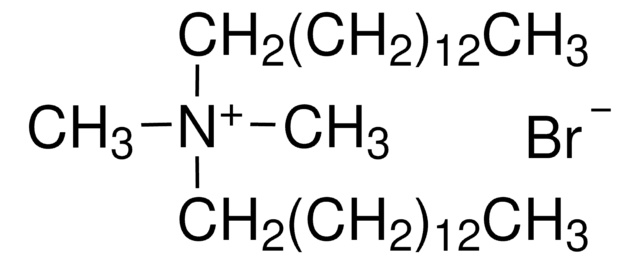53112
Trimethyloctadecylammonium chloride
≥95.0% (calc. on dry substance, T)
Synonym(s):
Octadecyltrimethylammonium chloride, Stearyltrimethylammonium chloride
About This Item
Recommended Products
Quality Level
Assay
≥95.0% (calc. on dry substance, T)
mol wt
348.05 g/mol
technique(s)
electrophoresis: suitable
protein quantification: suitable
impurities
≤3.0% water
pH
5.5-8.5 (20 °C, 0.05% in H2O)
λ
0.05 % in H2O
UV absorption
λ: 225 nm Amax: ≤0.08
λ: 260 nm Amax: ≤0.06
λ: 280 nm Amax: ≤0.04
λ: 340 nm Amax: ≤0.02
SMILES string
[Cl-].CCCCCCCCCCCCCCCCCC[N+](C)(C)C
InChI
1S/C21H46N.ClH/c1-5-6-7-8-9-10-11-12-13-14-15-16-17-18-19-20-21-22(2,3)4;/h5-21H2,1-4H3;1H/q+1;/p-1
InChI key
VBIIFPGSPJYLRR-UHFFFAOYSA-M
Looking for similar products? Visit Product Comparison Guide
Signal Word
Danger
Hazard Statements
Precautionary Statements
Hazard Classifications
Acute Tox. 4 Dermal - Acute Tox. 4 Oral - Aquatic Acute 1 - Aquatic Chronic 1 - Eye Dam. 1 - Skin Corr. 1C
Storage Class Code
8B - Non-combustible corrosive hazardous materials
WGK
WGK 3
Flash Point(F)
Not applicable
Flash Point(C)
Not applicable
Certificates of Analysis (COA)
Search for Certificates of Analysis (COA) by entering the products Lot/Batch Number. Lot and Batch Numbers can be found on a product’s label following the words ‘Lot’ or ‘Batch’.
Already Own This Product?
Find documentation for the products that you have recently purchased in the Document Library.
Customers Also Viewed
Our team of scientists has experience in all areas of research including Life Science, Material Science, Chemical Synthesis, Chromatography, Analytical and many others.
Contact Technical Service



